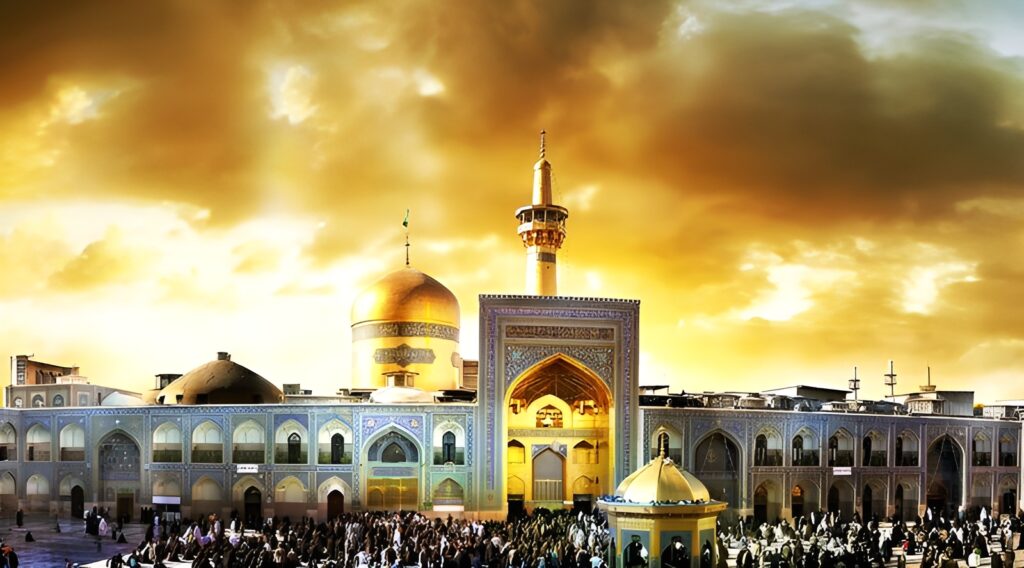His Name and Lineage
Name: Ali bin Musa bin Ja’far bin Muhammad bin Ali bin Al-Hussein bin Ali bin Abi Talib, peace be upon them all.
Lineage: Imam Ali al-Ridha belongs to a noble family, descending from the Prophet Muhammad ﷺ, through the pure Imams of the Ahl al-Bayt.
His Birth
Born: Imam Ali al-Ridha was born in the year 148 AH in Medina.
Imam’s Title
The Imam al-Ridha was known by several famous titles, including:
- Al-Ridha
- Al-Sabir
- Al-Radhi
- Al-Fadhil
- Al-Wafi
These titles reflect his great status and noble character among people.
His Kunya
His kunya is “Abu al-Hasan”, which is a common title among the Imams of Ahl al-Bayt, peace be upon them all.
Imam’s Attributes
Imam Ali al-Ridha was of medium height, handsome, and fair-skinned. He was known for his perfection in both physical and moral qualities, making him beloved among the people of his time.
His Contemporaries
Among the notable contemporaries of Imam Ali al-Ridha was Sheikh Ma’rouf al-Karkhi, one of the prominent figures of his time.
Imam’s Stories and Miracles
Imam Ali al-Ridha possessed great knowledge and unique miracles. He was known for his ability to foretell future events:
- One of his notable miracles was when he foretold eating grapes and pomegranates, and it came true.
- He also told a healthy man to prepare for something inevitable, and that man died three days later.
- In another incident, while with his companions, when Khalid bin Yahya al-Barmaki passed by with his face covered in dust, Imam Ridha said: “Woe to them, they do not know what will happen to them this year”, and soon after, their fate unfolded.
- He also mentioned to a traveler: “I am like Harun to Musa”, referring to his death and burial next to Harun.
Imam Ridha’s Sayings
It is narrated that Imam Ridha said: “A Muslim’s intellect is not complete until he possesses ten qualities: good is hoped from him, and evil is safe from him; he expects little good from himself and much from others…”
These words reflect his complete faith in sincere worship, humility, and his ability to see good in others.
He also said: “A believer is not truly a believer until he possesses three qualities: a tradition from his Lord, a tradition from his Prophet, and a tradition from his Wali.”
And he emphasized the need to rely on Allah, saying: “Fear only Allah.”
One of his most famous sayings about “the best of the servants” is: “Those who, when they do good, rejoice, when they do wrong, they seek forgiveness, when they give, they thank, when tested, they are patient, and when angry, they forgive.”
His Death
Imam Ali al-Ridha passed away on a Friday in the end of Safar, 203 AH.
According to al-Saduq in “Al-Oyoon,” he died in the month of Ramadan, on the ninth day, in the city of Tus in Khorasan.
He passed away in the village of “Sanabad,” located in northeastern Iran.
His Tomb
Imam Ali al-Ridha was buried in the city of Tus, which is now known as “Mashhad al-Muqaddas.”
The tomb of Imam Ali al-Ridha is considered one of the holiest places in the Islamic world, visited by millions of Muslims annually in respect and reverence for this great Imam.
Conclusion
Imam Ali bin Musa al-Ridha played a significant role in spreading knowledge and religion, and was one of the most prominent Imams during an important period in Islamic history.
His miracles, sayings, and wisdom continue to inspire Muslims and guide them in various aspects of life.
His death in Tus and his tomb in Mashhad became a place of blessings and spiritual guidance for those seeking knowledge and piety.

